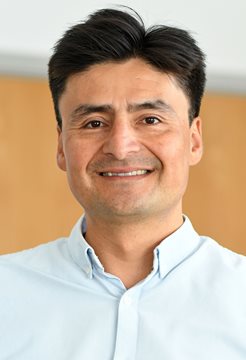
As part of national efforts to achieving zero new HIV transmissions by 2030, University Hospitals Sussex NHS Foundation Trust (UHSussex) launched a pilot initiative to screen all patients attending the Royal Sussex County Hospital A&E for HIV when having routine bloods, unless they opt out.
Since its launch in April 2022, more than 18,500 patients have been screened, and so far, one patient with undiagnosed HIV has been identified and started on effective and early treatment.
Dr Gillian Dean (pictured above) is a HIV consultant at UHSussex. She said: “Our emergency department process thousands of blood tests each month, giving us a great opportunity to detect, treat, and thereby reduce HIV in the city.”
It is estimated there are currently around 110 people living with undiagnosed HIV in Brighton and Hove, which is higher than the national average.
Dr Dean added: “Last year, half of the newly diagnosed people seen by the HIV team at the Royal Sussex County Hospital were diagnosed late. Opt-out testing aims to reduce this by potentially detecting HIV at an earlier stage, which not only improves the health of the patient but also reduces transmission as people can’t pass the virus on if they are on effective treatment.”

John Jaquiss (pictured right) has been living with HIV for 21 years.
He recalls: “It was a very scary time back then. AIDS was around for about 20 years before I was diagnosed with HIV. I was at the bedside of friends of mine who died and saw how quickly they deteriorated.”
John was diagnosed at the Lawson Unit, Royal Sussex County Hospital and was offered the chance to enrol onto clinical trials.
He added: “I was lucky that there was effective treatment available for me. In the early days, I had to take several pills twice a day. I remember the side effects being rather unpleasant. Now, thanks to fantastic developments in treatments, I take one pill, once a day with no side effects. It means I live a very healthy and active life and can’t pass the virus on. The Lawson Unit is amazing and the care I’ve received over the years has been incredible.”

“Improving access to testing is vital,” explains Professor Jaime Vera (pictured left), Consultant Physician at the Lawson Unit.
“Quite simply, if 100% of people knew their HIV status, and all those who tested positive for HIV received treatment we could reach zero new HIV infections. This is within our grasp and the ultimate goal we together with partner organisations are working towards,” he added.
Professor Vera is also a world-leading researcher in HIV medicine at Brighton and Sussex Medical School and an investigator for the Clinical Research Facility based the Royal Sussex County Hospital.
Together with the Martin Fisher Foundation, Professor Vera’s team developed a world-first, award-winning bespoke digital vending machine in 2018, which delivers easy-to-use HIV self-tests across Brighton.
There are now eight of these machines around Brighton and Hove, and others across the UK and internationally in Japan, Jamaica, New Zealand and Zambia.
Professor Vera is also leading an area of research to understand how living and ageing with HIV affects the brain. He said: “In Brighton, we have about 2,500 people living with HIV and thanks to developments in testing and treatment and increased life expectancy, about 60% of those are over the age of 50, which makes us one of the oldest cohorts of people living with HIV in Europe.”
Along with the existing combined geriatrics and HIV clinic, his team have introduced an innovative specialist HIV memory clinic (The Orange Clinic) at the Lawson Unit, which aims to improve the quality of life of people with HIV and cognitive impairment.
He said: “It’s the only clinic in the country that provides a one stop multidisciplinary service for assessment and management of people with HIV affected by memory concerns.”
The need to reducing HIV stigma
Reducing the experience of HIV stigma remains the biggest challenge for people living with HIV. Last year, UHSussex launched an HIV Allies project, with the aim of becoming an HIV stigma free hospital.
Eileen Nixon, consultant nurse at UHSussex, said: “There are serious health consequences if patients avoid treatment or decline HIV testing due to fears of stigma and discrimination in healthcare. We are proud to be leading on several stigma-reducing projects across our hospitals and the local health economy.”
Colleagues at UHSussex formed an HIV Allies working group, aiming to promote and support safe and best practice within the Trust for people living with and affected by HIV and reduce experiences of HIV stigma across the Trust’s hospitals.
Opt-out HIV testing at the Royal Sussex County Hospital emergency department also plays an important role in reducing HIV stigma by normalising testing, making it part of standard care.